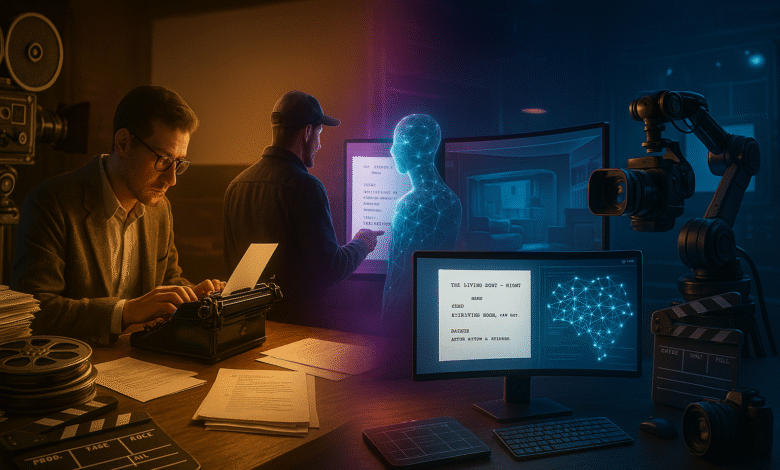The Impact of AI on Scriptwriting and Movie Production
Discover how artificial intelligence transforms scriptwriting and movie production. Learn about AI tools, benefits, challenges, and the future of filmmaking technology.

The entertainment industry stands at the cusp of a technological revolution that’s fundamentally changing how stories are told and movies are made. Artificial intelligence in filmmaking has evolved from a futuristic concept to an essential tool that’s reshaping every aspect of movie production, from initial script development to final post-production editing.
AI scriptwriting and AI film production technologies are no longer experimental luxuries—they’re becoming industry standards that help studios reduce costs, enhance creativity, and streamline complex production workflows. The numbers tell a compelling story: approximately 70% of movies now integrate AI technologies during production, and the global AI in film market is projected to reach $14.1 billion by 2033, growing at an impressive 25.7% annual rate.
This technological shift isn’t just about automation; it’s about empowering filmmakers with tools that can analyze scripts with 90% accuracy in predicting box office success, reduce editing time by 40%, and open new creative possibilities that were previously impossible or prohibitively expensive. As we explore this transformation, we’ll examine how artificial intelligence movie production is creating both opportunities and challenges for an industry built on human creativity and storytelling.
EXPLORE THE CONTENTS
Understanding AI in Modern Filmmaking
What Is AI in Film Production?
AI film production encompasses the application of advanced computational algorithms throughout various stages of the filmmaking process. These technologies automate repetitive tasks, enhance creative decision-making, and provide data-driven insights that help filmmakers optimize their work. From script analysis to visual effects generation, artificial intelligence is becoming an integral part of how movies are conceived, produced, and delivered to audiences.
The technology relies on several core components including machine learning algorithms, natural language processing, and predictive analytics. These systems can process vast amounts of data, identify patterns, and generate content that would traditionally require extensive human labor and time.
The Current Market Landscape
The AI in filmmaking market has experienced explosive growth, particularly since the widespread adoption of generative AI tools in 2022. According to recent industry reports, at least 65 new AI-centric film studios have launched globally since 2022, with over 30 new studios emerging in 2024 and early 2025 alone.
This growth reflects the industry’s recognition that AI-powered tools aren’t just novelties—they’re essential for remaining competitive in an environment where audience expectations continue rising while production budgets face increasing scrutiny.
AI’s Revolutionary Impact on Scriptwriting
Automated Script Generation and Analysis
AI scriptwriting has moved beyond simple text generation to become a sophisticated collaborative tool for writers and producers. Modern artificial intelligence scriptwriting systems can analyze thousands of existing scripts to identify successful patterns, generate compelling dialogue, and suggest plot developments that resonate with target audiences.
These AI scriptwriting tools offer several key capabilities:
- Content Generation: Creating original storylines, character dialogues, and scene descriptions based on specific prompts or themes
- Script Analysis: Evaluating existing scripts for pacing, character development, and commercial viability
- Genre Optimization: Tailoring content to specific genres by analyzing successful films in those categories
- Bias Detection: Identifying and suggesting corrections for unconscious biases in character representation and storytelling
Natural Language Processing in Storytelling
The foundation of AI scriptwriting lies in advanced natural language processing technologies. These systems understand context, emotional tone, and narrative structure in ways that enable them to generate human-like content while maintaining consistency with established characters and storylines.
Writers are finding that AI scriptwriting software serves as an invaluable brainstorming partner, offering fresh perspectives and helping overcome creative blocks. Rather than replacing human creativity, these tools amplify it by providing writers with a constant stream of ideas and alternatives they might not have considered.
Collaboration Between Human Creativity and AI
The most successful applications of AI in scriptwriting involve human-AI collaboration rather than replacement. Writers use these tools to:
- Generate Initial Concepts: AI can produce dozens of story concepts based on basic parameters, giving writers a starting point for development
- Develop Character Backstories: Artificial intelligence can create detailed character histories that inform dialogue and motivations
- Optimize Dialogue: AI analyzes speech patterns and suggests improvements to make conversations more natural and engaging
- Test Narrative Structures: Writers can experiment with different plot structures and pacing options generated by AI
Transforming Production Workflows
Pre-Production Revolution
AI film production is fundamentally changing how movies are planned and prepared. In pre-production, artificial intelligence streamlines numerous labor-intensive processes that traditionally required weeks or months of human effort.
Storyboarding and Visualization: AI-powered storyboarding tools can generate visual representations of scripts, allowing directors and producers to visualize scenes before shooting begins. These tools analyze script descriptions and create detailed scene layouts, camera angles, and basic animations that help teams plan their shoots more effectively.
Casting and Talent Selection: Machine learning algorithms analyze actor performances, audience reception data, and character requirements to suggest optimal casting choices. While the final decisions remain with human casting directors, AI provides valuable insights into which actors might resonate most strongly with target audiences.
Production Enhancement
During filming, AI in movie production provides real-time support that enhances both creative and technical aspects of the process.
Real-Time Performance Analysis: AI systems can analyze footage as it’s being shot, providing immediate feedback on lighting, composition, and actor performance. This capability allows directors to make informed adjustments on set, reducing the need for costly reshoots.
Automated Script Supervision: AI script analysis tools track continuity, ensuring that scenes match established timelines and character developments. This reduces errors that might otherwise be caught only during post-production.
Post-Production Acceleration
AI in film production delivers its most dramatic time and cost savings during post-production. The technology has proven capable of reducing editing time by up to 40% while maintaining or improving quality standards.
Automated Editing: AI editing tools can assemble rough cuts by analyzing script timing, identifying key emotional moments, and selecting the best takes from multiple camera angles. While human editors refine these cuts, the initial assembly process becomes exponentially faster.
Visual Effects Generation: AI-generated visual effects can create realistic environments, characters, and special effects that would traditionally require large teams and extensive manual work. The technology has advanced to the point where AI visual effects are increasingly indistinguishable from traditionally created content.
Color Grading and Audio Enhancement: Artificial intelligence can analyze footage and automatically apply color corrections and audio enhancements that match established aesthetic guidelines for specific projects.
Economic Impact and Cost Reduction
Production Budget Optimization
The financial impact of AI in filmmaking extends far beyond simple cost reduction. AI film production enables studios to optimize their budgets by providing accurate predictions about which elements of a production will deliver the highest return on investment.
Predictive Analytics for Budget Allocation: Machine learning algorithms analyze historical data to predict how different budget allocations will impact final film quality and audience reception. This allows producers to make more informed decisions about where to invest their resources. According to industry research from Grand View Research, the global AI in media and entertainment market is experiencing unprecedented growth as studios recognize these financial benefits.
Reduced Labor Costs: While AI automation doesn’t eliminate jobs, it does reduce the number of person-hours required for many tasks. A visual effects sequence that might have required seven people working for seven days can now be completed by one person in half a day using AI-powered tools.
Market Predictions and Risk Assessment
AI script analysis has proven remarkably effective at predicting commercial success. Systems can now forecast box office performance with 90% accuracy by analyzing script elements, casting choices, and market conditions. This capability helps studios make more informed decisions about which projects to greenlight and how to position them in the marketplace.
Challenges and Ethical Considerations
The Human Element Debate
Despite the impressive capabilities of AI in scriptwriting and movie production, significant concerns remain about maintaining the human elements that make storytelling compelling. Critics argue that artificial intelligence lacks the emotional depth and lived experience that inform great writing.
Emotional Authenticity: While AI scriptwriting can generate technically proficient dialogue and plot structures, questions remain about whether it can capture the genuine human emotions that resonate with audiences. The technology excels at pattern recognition but struggles with the nuanced understanding of human experience that drives compelling storytelling.
Cultural Sensitivity: AI systems trained on existing content may perpetuate historical biases or fail to understand cultural nuances that human writers naturally incorporate into their work.
Industry Labor Concerns
The rise of AI film production has sparked significant debate about job displacement and fair compensation. The 2023 Hollywood writers’ and actors’ strikes highlighted these concerns, with creative professionals demanding protections against AI automation that might reduce opportunities for human talent.
Job Evolution vs. Elimination: While some entry-level and mid-level positions may be reduced, AI in filmmaking is also creating new roles such as AI directors, creative technology experts, and machine learning editors. The industry must adapt its training and education systems to prepare workers for these evolving roles. Research from the Creative Media Industries Institute emphasizes that AI should be viewed as a collaborative tool that requires new skills rather than a replacement for human creativity.
Copyright and Creative Ownership
AI-generated content raises complex questions about intellectual property and creative ownership. When an AI system generates a script or visual effect, determining who owns the rights to that content becomes legally and ethically complicated.
Future Trends and Innovations
Emerging Technologies
The future of AI in movie production promises even more dramatic changes as new technologies mature and become accessible to filmmakers.
Generative AI Video: Tools like OpenAI’s Sora can generate up to one minute of photorealistic video content from text prompts. As these technologies improve, they may enable entirely AI-generated films that require minimal traditional production resources.
Real-Time AI Integration: Future AI film production systems will provide even more sophisticated real-time feedback during filming, potentially enabling directors to see final visual effects and color grading as scenes are being shot.
Democratization of Filmmaking
AI-powered filmmaking tools are lowering barriers to entry for independent creators. Small studios and individual filmmakers can now access capabilities that were previously available only to major studios with substantial budgets.
Independent Creator Empowerment: AI scriptwriting and production tools enable creators to produce high-quality content from home computers, potentially disrupting traditional studio-centric production models.
Global Market Expansion
The AI in film market is experiencing rapid growth across different regions, with Asia Pacific expected to be the fastest-growing market due to increasing investments in AI technology and supportive government policies.
Regional Adaptations: AI systems are becoming more sophisticated at understanding cultural differences and local preferences, enabling better content localization and personalization for global audiences.
The Road Ahead for AI and Filmmaking
Integration Best Practices
Successful implementation of AI in scriptwriting and movie production requires thoughtful integration that enhances rather than replaces human creativity. The most effective approaches involve:
Collaborative Workflows: Using AI as a creative partner rather than a replacement, with human oversight ensuring that technological capabilities serve storytelling goals.
Ethical Guidelines: Developing industry standards that protect creative workers while embracing beneficial AI innovations.
Continuous Learning: Staying current with rapidly evolving AI technologies while maintaining focus on fundamental storytelling principles.
Quality and Authenticity Assurance
As AI-generated content becomes more prevalent, the industry must develop new methods for ensuring quality and authenticity. This includes establishing standards for AI system training data, output verification, and human oversight requirements.
The future success of AI in filmmaking depends not just on technological advancement but on the industry’s ability to integrate these tools in ways that preserve the human elements that make cinema compelling while leveraging artificial intelligence to enhance creativity, efficiency, and accessibility.
Conclusion
The integration of artificial intelligence in scriptwriting and movie production represents a fundamental shift in how films are created, not merely an incremental improvement in existing processes. With 70% of movies now incorporating AI technologies and the market projected to reach $14.1 billion by 2033, this transformation is both inevitable and accelerating. AI film production offers unprecedented opportunities for cost reduction, creative enhancement, and democratized filmmaking access, while AI scriptwriting is evolving into a powerful collaborative tool that amplifies human creativity rather than replacing it. However, the industry must navigate significant challenges around job displacement, creative authenticity, and ethical implementation to ensure that artificial intelligence serves storytelling rather than supplanting the human elements that make cinema meaningful. The most successful path forward involves embracing AI as a creative partner that enhances human capabilities while maintaining the emotional depth and cultural sensitivity that only human storytellers can provide, ultimately creating a future where technology and creativity work together to push the boundaries of cinematic expression.







